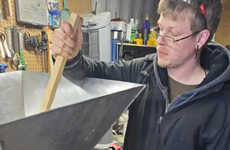
This Plastic Thatch Roofing Method is Reducing Waste and Creating Jobs
Alyson Wyers — June 13, 2014 — Eco
References: reuseeverything.org & psfk
Plastic thatch roofing not only reduces waste by reusing PET bottles, but it also creates durable housing and jobs in the process. Strategic Economics Professor Dr. David Saiia of Duquesne University conceived an alternative solution for people in the developing world who have been running traditional resources dry thatching reedy roofs.
Dr. Saiia's process cuts down on the amount of ecosystem-harming waste that would otherwise accumulate in the South American rainforests. This process uses a hand-powered bottle-slicing machine that creates strips of plastic that can be attached to bamboo or melted together. This plastic thatch roofing method lasts much longer than traditional reeds while also providing inhabitants with enough ventilation.
In addition to this innovative process, Dr. Saiia hopes to establish a cottage industry that will create jobs for local community members who can make, sell and install roofs.
Dr. Saiia's process cuts down on the amount of ecosystem-harming waste that would otherwise accumulate in the South American rainforests. This process uses a hand-powered bottle-slicing machine that creates strips of plastic that can be attached to bamboo or melted together. This plastic thatch roofing method lasts much longer than traditional reeds while also providing inhabitants with enough ventilation.
In addition to this innovative process, Dr. Saiia hopes to establish a cottage industry that will create jobs for local community members who can make, sell and install roofs.
Trend Themes
1. Recycled Plastic Roofing - Developing more sustainable construction materials can reduce waste, cut costs, and help fight climate change.
2. Hand-powered Machines - Using simple, hand-powered machines can reduce electricity consumption and make production processes more sustainable.
3. Cottage Industries - Creating local jobs by establishing cottage industries can benefit communities economically and socially.
Industry Implications
1. Construction - Innovations in construction materials can enhance the sustainability and durability of buildings.
2. Manufacturing - Developing and implementing more sustainable manufacturing processes can reduce waste and environmental impact.
3. Social Enterprises - Creating social enterprises that provide jobs and benefit local communities can have a positive impact on economic development and sustainability.
6.1
Score
Popularity
Activity
Freshness























